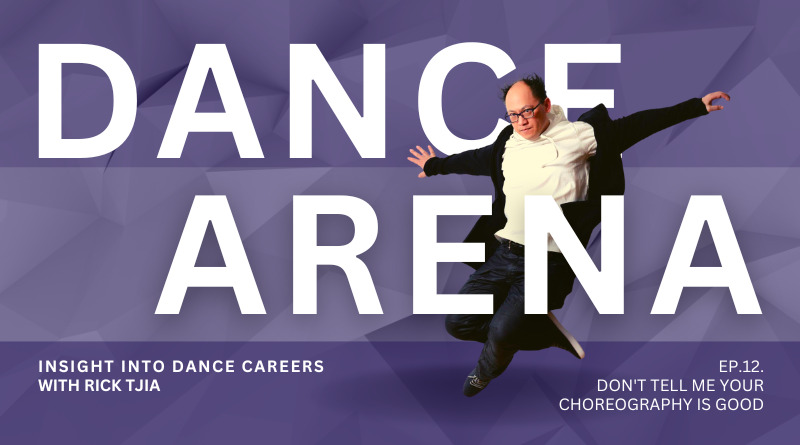DanceArena Ep. 12. – Don’t Tell Me Your Choreography is Good

There is a battle that goes on between two main aspects of every choreography that no one even knows is happening: the quality of the choreography itself versus the actual physical skill of the artist on stage. Great content is usually a mixture of both, but people are very influenced by impressions— which in many cases means that physical skill trumps creative structure.
When an artist a choreographer is working with is incredible in and of himself and is allowed to show incredible skills on stage, then choreography is nearly irrelevant. No matter how bad the choreographer is, if the artist is allowed to do his thing on stage, then the piece will still have value in the eyes of an audience. And if on top of it the choreography is good— well then what is already incredible will simply be enhanced.
Now a mediocre choreographer can make talented people look mediocre. But the truly talented choreographer is the one who can make magic happen with mediocre artists. Often the audience doesn’t see the difference, because they’re trying too hard: either trying too hard to like what has already been deemed by peers or by the media as being of exceptional or unquestionable artistic merit, or trying too hard to understand the “message.” Either that, or they cannot distinguish the artist’s skill from the actual choreography.
If we don’t understand what is going on, perhaps the creator is just too creative or innovative for us to understand. At least, that is the general feeling.
We often try very hard to like what we don’t understand, not wanting to be seen as “first degree”, or as a slave to pop culture. But sometimes there is nothing to understand, and sometimes a show simply doesn’t work. Just because it’s avant-garde doesn’t make it deep, just as incomprehensibility does not make for better art. If you, as an audience member, say it as you see it, you may bruise some egos— but you’d be honest, and that would at least be of help to some…
But be careful: we tend to get used to things if we are exposed to them enough times, and just because we’re used to something does not make it de facto good. We see it happen in the music industry: for example, there is a certain way of mixing and mastering music for pop radio that we’ve become used to; so much so that we have equated it with professionalism. The truth is that there are many ways of mixing and mastering depending on the feel and how a musician/group wants to sound. If it does not sound like a pop mix, that doesn’t necessarily make it less professional nor less good. Familiarity can be a trap, which is why it is so difficult to be a success with something that is too new or different.
As an audience member, I don’t want to be told that something is creative or innovative. Those terms are not only irrelevant, but so overused that they no longer have any useful meaning (or at best, mean too many different things to too many people). If a work touches me, then I’ll have an affinity for it. I will make my own decision on whether it is creative or not. That’s all that matters anyway, because my perception is mine and only mine to have. Or mine to change, as the case may be.
If you don’t see anything in it, it doesn’t make you stupid.
However, saying you see something you don’t does make you a hypocrite.
Back to Home
Editor's Note: At StageLync, an international platform for the performing arts, we celebrate the diversity of our writers' backgrounds. We recognize and support their choice to use either American or British English in their articles, respecting their individual preferences and origins. This policy allows us to embrace a wide range of linguistic expressions, enriching our content and reflecting the global nature of our community.
🎧 Join us on the StageLync Podcast for inspiring stories from the world of performing arts! Tune in to hear from the creative minds who bring magic to life, both onstage and behind the scenes. 🎙️ 👉 Listen now!
